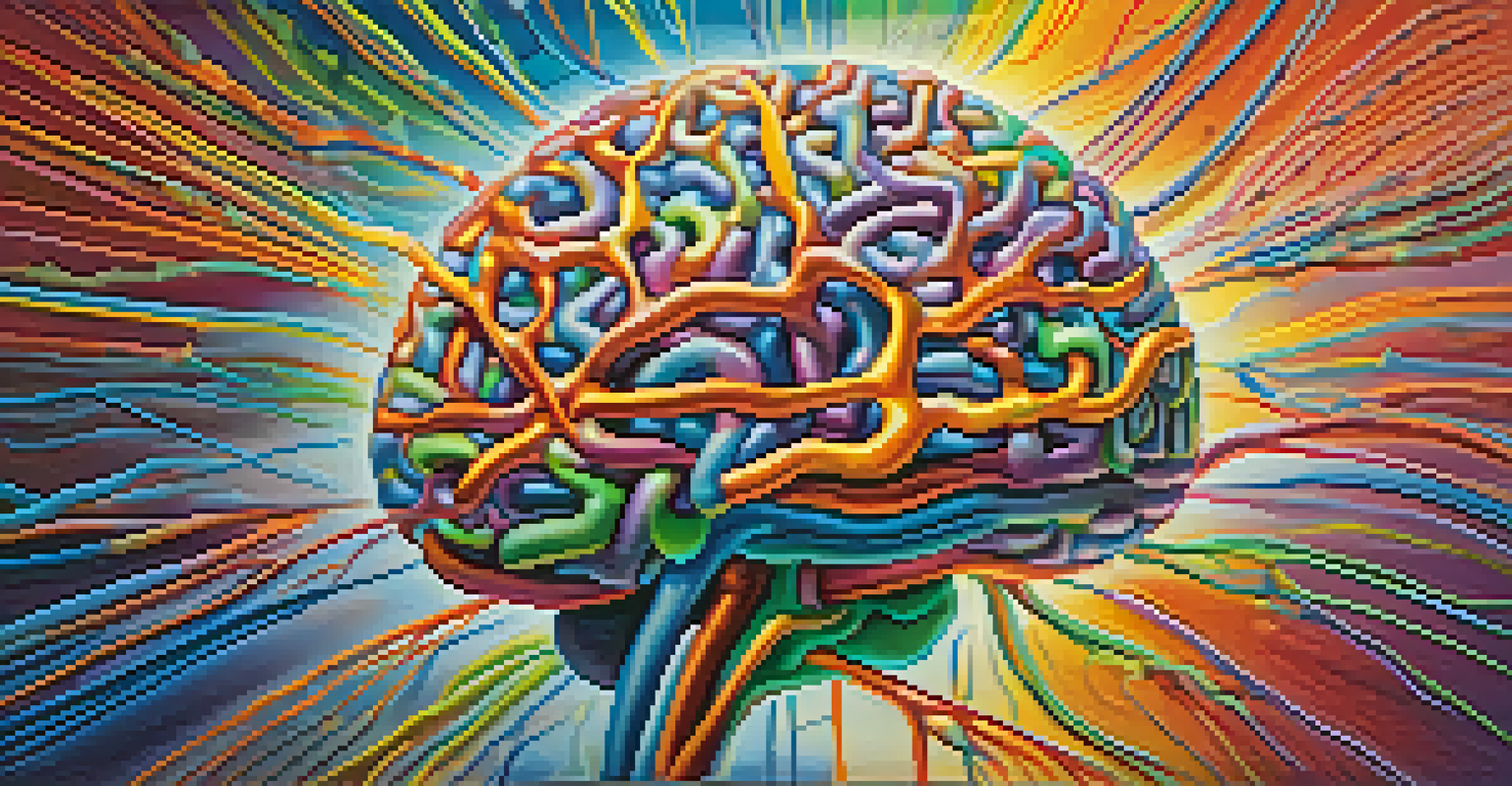The Role of Psychedelics in Brain Function and Healing

Understanding Psychedelics and Their Effects
Psychedelics are substances that can alter perception, mood, and cognitive processes. Common examples include psilocybin, found in magic mushrooms, and LSD. These compounds have been used for centuries in various cultures, often for spiritual or healing purposes.
Psychedelics can help us confront and process unresolved emotions or traumas, offering a path to healing.
Recent studies suggest that psychedelics may promote neuroplasticity, which is the brain's ability to reorganize itself by forming new neural connections. This is particularly intriguing for mental health, as it could mean that psychedelics help the brain heal from trauma or stress-related disorders.
Moreover, psychedelics can lead to profound experiences that may foster a sense of interconnectedness and introspection. These experiences can be therapeutic, allowing individuals to confront and process unresolved emotions or traumas.
The Science Behind Psychedelic Healing
Research indicates that psychedelics affect serotonin receptors in the brain, particularly the 5-HT2A receptor. This interaction can enhance mood and perception, leading to altered states of consciousness. In clinical settings, this mechanism is harnessed to treat various mental health conditions.

For instance, studies have shown that psychedelics can significantly reduce symptoms of depression and anxiety in patients. The therapeutic effects are often linked to the intensity of the experiences, which can lead to lasting changes in perspective and emotional resilience.
Psychedelics Promote Neuroplasticity
Research shows that psychedelics enhance neuroplasticity, potentially aiding in the healing of mental health disorders.
Additionally, psychedelic-assisted therapy combines these substances with professional guidance, creating a supportive environment for healing. This approach helps individuals navigate their experiences, making the healing process safer and more effective.
Psychedelics and Neuroplasticity
Neuroplasticity is a fascinating concept that refers to the brain's ability to change and adapt throughout life. Psychedelics appear to enhance this process, encouraging the growth of new neurons and synapses. This can be particularly beneficial for those with mental health challenges, as it opens up new pathways for healing.
The future of psychedelics in medicine is bright, as we begin to understand their potential to transform mental health treatment.
In a world where many feel stuck in their thoughts and behaviors, psychedelics offer a potential way to 'reset' the mind. By facilitating new connections, they can help individuals break free from negative patterns and develop healthier coping mechanisms.
Research in this area is still emerging, but initial results are promising. They suggest that psychedelics may not just be a temporary fix but could lead to long-term changes in brain function and emotional well-being.
Psychedelics in Treating PTSD
Post-Traumatic Stress Disorder (PTSD) is a condition that affects many individuals, often leading to debilitating symptoms. Emerging evidence suggests that psychedelics, particularly MDMA, can be effective in treating PTSD. The substance allows individuals to confront their traumatic memories in a safe and supportive environment.
During therapy sessions, patients report feeling more connected and less fearful, which can enable them to process their trauma more effectively. This therapeutic approach not only reduces symptoms but can also foster a sense of empowerment and control over one's life.
Effective Treatment for PTSD
Emerging evidence suggests that psychedelics, especially MDMA, can help individuals confront and process traumatic memories effectively.
While more research is needed, the results so far are encouraging. They highlight the potential of psychedelics as a valuable tool in the ongoing battle against PTSD, offering hope to those who feel trapped by their past.
The Role of Set and Setting in Psychedelic Experiences
The concept of 'set and setting' plays a crucial role in the effectiveness of psychedelic experiences. 'Set' refers to the individual's mindset, while 'setting' pertains to the physical and social environment. Together, these factors can significantly influence the outcomes of psychedelic journeys.
A supportive and safe setting can enhance the therapeutic effects of psychedelics, allowing individuals to fully engage with their experiences. Conversely, an uncomfortable environment can lead to anxiety and negative experiences, potentially hindering the healing process.
Therefore, incorporating thoughtful considerations of set and setting into psychedelic therapy is essential. This approach helps create an atmosphere conducive to healing, ensuring that individuals can benefit from their experiences to the fullest.
Potential Risks and Considerations
While psychedelics show promise, they are not without risks. For some individuals, particularly those with a history of certain mental health conditions, psychedelics can trigger adverse reactions or exacerbate symptoms. This underscores the importance of professional guidance during psychedelic experiences.
Additionally, the legal status of these substances can complicate access to therapeutic use. As research continues to unfold, it's vital to advocate for responsible use and a better understanding of the complexities involved.
Set and Setting Matter
The effectiveness of psychedelic experiences is significantly influenced by an individual's mindset and the physical environment in which they occur.
Ultimately, acknowledging the potential risks while also recognizing the transformative power of psychedelics is essential. A balanced approach can pave the way for safe exploration of these substances in therapeutic contexts.
The Future of Psychedelics in Medicine
As the stigma surrounding psychedelics continues to diminish, the future of these substances in medicine looks promising. Research institutions and universities are increasingly exploring their therapeutic potential, paving the way for new treatment options for mental health issues.
With successful trials and growing acceptance, we may soon see psychedelics integrated into mainstream therapeutic practices. This could provide patients with innovative ways to address their mental health challenges, combining traditional methods with cutting-edge science.

In summary, the evolving landscape of psychedelics in medicine holds great potential. As we learn more about their effects on brain function and healing, we may unlock new pathways for improved mental health and well-being.